Return to Island of the “Lost Indonesia Jews”
Posted on 21. Jan, 2026 by Paul Sochaczewski in Curious Travel

Return to Island of the “Lost Indonesia Jews” Seven Years Later, the Mystery Remains Unsolved Happy World Religion Day — January 18 KISAR ISLAND, Maluku, Indonesia In 2018 I traveled to the tiny and isolated Kisar Island to try to solve a mystery. Like most of my quests, the trigger came […]
Read MoreThe Two Mice That Have Influenced the World
Posted on 22. Oct, 2025 by Paul Sochaczewski in Ganesha and Collecting

The Two Mice That Have Influenced the World Recognizing the Rodents That Helped Create an Entertainment Empire and Enhanced the Power of a Much-Loved God Birthday of Mickey and Musika — November 18 HOLLYWOOD and GUJARAT On November 18, 1928, a lovable cartoon rodent named Mickey Mouse was introduced to the […]
Read More10 November — Opening of COP 30 of the United Nations Framework Convention on Climate Change
Posted on 20. Jul, 2025 by Paul Sochaczewski in Alfred Russel Wallace and his assistant Ali

Ah, yet another international gathering to discuss progress in addressing the problem of climate change. This year it will be held in Belém, Brazil, and the participants will also focus on nature conservation in the country, including the vast Amazon region. I’ve been following Victorian naturalist Alfred Russel Wallace for some 50 years, including a […]
Read MoreHappy Birthday Thomas Barbour
Posted on 08. Aug, 2025 by Paul Sochaczewski in Books
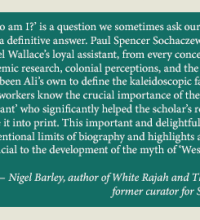
Happy Birthday Thomas Barbour When writing about historical characters, scholars search letters, journals, media accounts, and personal memories for the holy grail that “proves” a speculation about events and motivations. From these sources, historians then evaluate and triangulate until, like Miss Marple, they reach a satisfactory solution to the puzzle. (Or as […]
Read MoreHappy World Rainforest Day – June 22
Posted on 29. Aug, 2025 by Paul Sochaczewski in Environment EarthLove
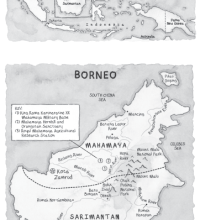
Happy World Rainforest Day – June 22 Rema and Olivia were like pit bulls that refused to let go of the prey in their mouths. Few things are as hard to dislodge as a belief that you have repeated to yourself over and over. The psychologists call this embedment. When we invest energy […]
Read MoreForeword for Shadows of the Ring of Fire
Posted on 20. Oct, 2025 by Paul Sochaczewski in Articles

SHADOWS OF THE RING OF FIRE Foreword to New Book by Lawrence Blair I was honored to write the foreword for my friend Lawrence Blair’s new book, Shadows of the Ring of Fire: Fading Dreams of a Vanishing World on a Warming Earth, details at the end of this article. This short piece […]
Read MoreIntro to a speculative biography of Ali
Posted on 29. Aug, 2025 by Paul Sochaczewski in Alfred Russel Wallace and his assistant Ali
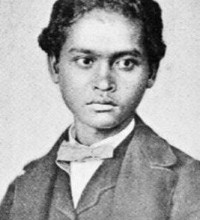
My speculative biography of Ali, Alfred Russel Wallace’s assistant, was honored as the Best Historical Book of 2024 by the United States Peace Corps Writers. Here’s an excerpt from the book’s introduction. Look Here, Sir, What a Curious Bird Intro to a speculative biography of Ali, Alfred Russel Wallace’s assistant in the Malay Archipelago […]
Read MoreLightning Teeth Help Win a Lover’s Heart and Guarantee an Election Victory
Posted on 29. Aug, 2025 by Paul Sochaczewski in Articles

SAN ANTONIO, Siquijor Island, The Philippines
What a wonderful world we live in, I thought. For just ten dollars I could buy a small bottle crammed with a magical potion made out of herbs and scrapings of “lightning teeth.” According to Juan Ponce, the elderly traditional healer who created the concoction, the mystical brew will help the bearer entice new lovers. Enjoy business prosperity. Even win a gubernatorial election.
Read MoreAlfred Russel Wallace and Things That Go Bump in the Night
Posted on 06. Feb, 2025 by Paul Sochaczewski in Alfred Russel Wallace and his assistant Ali, Articles
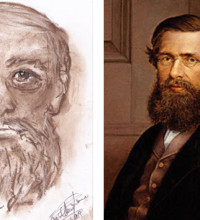
Alfred Russel Wallace is best known for his scientific achievements — collecting and documenting hundreds of new species of “natural productions,” major insights into biogeography, island endemism, and cultural anthropology, and notably, his development of a theory of evolution by natural selection independently of and prior to that of Charles Darwin. But Wallace was also […]
Read MoreQuests: Last Shaman of Sarawak
Posted on 15. Sep, 2024 by Paul Sochaczewski in Articles

THE ALMOST LAST SHAMAN It’s been a good ride, but Borneo healer doesn’t expect many others to follow his path. SERUBAH ULU, Sarawak, Malaysia To the untrained eye he seems an unlikely magician. Frail, but with a hundred-watt smile. He has two wispy whiskers, short grey hair, and he walks a bit slowly. […]
Read MoreSearching for Orwell
Posted on 25. Jun, 2024 by Paul Sochaczewski in Articles, Curious Travel
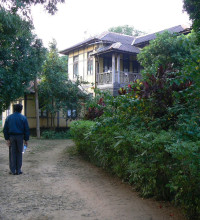
There are worse travel strategies than to visit places with evocative names.
There’s Timbuktu, Congo, and Okavango in Africa; and Salvador de Bahia, Darien, and Patagonia in Latin America, names which purr with history and poetry.
But Asia’s resonant place names beckon to me above all others. There’s Sumatra, Java, and Borneo; Malacca, Vientiane, and Makassar; Kelantan, Kathmandu, and Ayudhya. Not to mention the rivers: Ganges and Yangtze, Mahakam and Mekong. And the one I was headed towards: Ayeyarwady.
My destination was Katha, a small town on the Ayeyarwady (Irrawaddy) River, which has achieved a modicum of recognition. It was here, between 1926 and 1927, that a British policeman named Eric Blair spent six months as one of 90 British police officers in Burma. Eric Blair, who subsequently took the pen name George Orwell, based his 1934 novel Burmese Days on a fictionalized version of Katha that he dubbed Kyauktada (which is derived from the name of a district in Rangoon).
Read MoreQuests
Posted on 10. Jun, 2024 by Paul Sochaczewski in Books
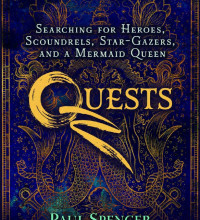
Quests is a volume of 24 personal adventures pursued over more than 50 years— at times obscure, long-gestating, sentimental, and ridiculous.
Quests don’t have to be cinematic or physical. A quest might be as seemingly low-key as getting a degree, eating escargots in Paris, learning a language, or mastering the art of making puff pastry.
I will never climb K2 or windsurf across the Atlantic. I don’t intend to attempt to “discover” an uncontacted tribe in the Amazon, locate the source of the Nile, or find the Holy Grail.
I’d like to know what quests you’ve chosen. Big or small? Distant or close to home? Did you achieve your goal? If not, does it matter?
Read MoreUncle Joe and Aunt Anisoara
Posted on 10. Jun, 2024 by Paul Sochaczewski in Articles
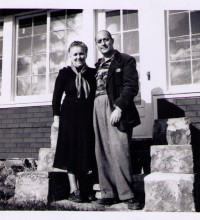
My uncle and aunt’s love affair illustrates the challenges of trying to decipher a relationship.
How could I not love an uncle who, when he babysat me, let me stay up well past my bedtime to watch wrestling (Antonino Rocca was my favorite) and horror movies (Boris Karloff’s The Mummy was the scariest)? How could I not love an uncle who lived in the middle of Greenwich Village, who took me to my first Broadway show, who tried to disprove Einstein? How could I not love an uncle who invented a slew of often-useless gadgets, and who chastised major corporations for their lousy ad campaigns — and then offered them new campaigns that were hardly better? How could I not love an uncle who married a wannabe Romanian noble and bought a farm in the middle of the Adirondack mountains because it resembled his wife’s native Transylvania?
Uncle Joe Rubin died of colon cancer in 1960 when I was 13. I was at an age when I was particularly incurious about life’s complexities and more than a little spooked by having a close family member wither away in our spare room.
Read MoreQuests
Posted on 15. Sep, 2024 by Paul Sochaczewski in Articles
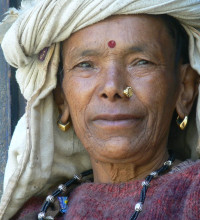
Consider the great cultural and religious myths — the Mahabharata, Beowulf, the Epic of Gilgamesh, Faust, the Divine Comedy, King Arthur and His Knights of the Round Table, the Odyssey, the Ring cycle — which feature a hero (I’m using the term to encompass men and women) who undertakes a journey to uncover a mystery, right a wrong, seek fame or fortune or happiness.
Now think of the classic films — Star Wars, The Wizard of Oz, Die Hard, Casablanca, Gone With the Wind — which explore similar “searching-for” dynamics.
Philosopher Joseph Campbell called these archetypal scenarios the Hero’s Journey. And I suggest they are as important to you and me as they are to Luke Skywalker or Dorothy from Kansas.
Read MoreThe Real First White Rajah of Borneo
Posted on 15. Sep, 2024 by Paul Sochaczewski in Articles, Sultan and the Mermaid Queen
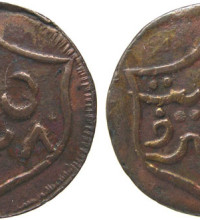
I belong to a small group of people curious about the life and times of Alexander Hare. When we get together, we ponder an improbable question: How did an ambitious 19th-century slave-owner, harem-builder, and political arriviste become the First White Rajah of Borneo?
The bigger question: How does one become king or queen numero uno? More specifically, how might I become the first Supreme Leader With Wisdom Like Solomon Whose Eyes Spot Prey Like an Eagle and Whose Courage Rivals That of a Tiger of my own country?
Read More